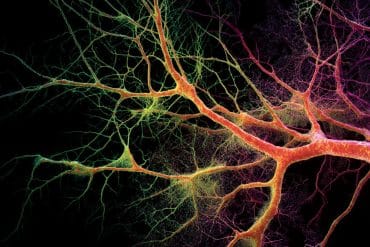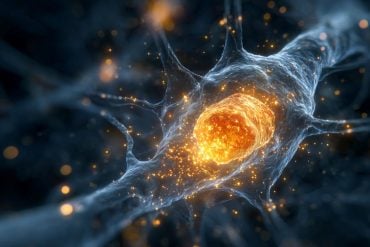Summary: Touch can strengthen bonds and calm stress, but not all affection is sincere. A new study reveals that people with “dark triad” traits—narcissism, psychopathy, and Machiavellianism—often use physical touch to control or manipulate their romantic partners.
Women with these traits were more likely to use touch manipulatively while disliking being touched themselves, whereas anxious men used touch for reassurance. The findings reveal that even gestures that seem loving can mask control and self-serving intent.
Key Facts:
- Manipulative Touch: People high in narcissism, psychopathy, and Machiavellianism often use touch to control partners.
- Gender Differences: Women with dark triad traits resisted being touched but used touch manipulatively; men used touch for reassurance.
- Therapeutic Potential: Understanding the misuse of touch may guide interventions that promote healthy, reciprocal affection.
Source: Binghamton University
A hug can soothe your mind, reduce your stress and actually activate oxytocin, the “love hormone,” in your body. But new research from Binghamton University, State University of New York reveals that not all hugs are harmless – some partners use touch as a means of control.
People with “dark triad” personality traits – narcissism, psychopathy and Machiavellianism – are more likely to use touch to manipulate their partners, according to a new paper published in Current Psychology by Richard Mattson, professor of psychology at Binghamton University, and a team of students.
“What’s new about our work isn’t just in identifying problematic uses of touch — it’s linking those behaviors to the type of person who is inclined to use them on a romantic partner.”” said Mattson.
“Not only are you not getting the benefits of touch in these relationships, but the flip side of that is that they are powerful, so they can actually be used in the service of oneself at the expense of the relationship partner.”
A focus in relationship science in recent years has been on how people can leverage touch in relationships to promote overall relationship health. While most psychologists interested in this topic are focused on the benefits of touch, Mattson and his team wanted to explore the darker side.
“It’s kind of a hot topic within relationship science, but we took a slightly different viewpoint, noting that not all forms of touch are well-intentioned, even if topographically, they look similar to other types of touch,” Mattson said.
“What we were looking at is the manipulative use of touch alongside an individual’s preference not to be touched.”
The team investigated how specific attachment styles and personality traits impact the way people give and receive physical affection in intimate relationships.
They surveyed over 500 college students, asking questions about their overall comfort with being touched, the extent to which they would maneuver themselves away from touch due to discomfort, and their use of touch in ways that aren’t beneficial to the other person.
They found those with “dark triad” personality traits: psychopathy, narcissism, and Machiavellianism (i.e., cunning, manipulative) are more likely to use touch to manipulate their partner in a relationship.
The results varied by gender. For men, comfort with being touched was more associated with relationship insecurity.
Men who were anxious about their relationship status were more likely to use touch to get reassurance from their partners, whereas those who were uncomfortable with closeness did not like being touched themselves, irrespective of other personality traits.
Women who possessed “dark triad” traits were more uncomfortable with being touched themselves but likelier to use touch as a means of manipulation.
People with high levels of dark triad traits tend to have short-term romantic relationships, said Mattson. They’re fraught with difficulty, sometimes even violence. However, researchers don’t know much about how those traits play out specifically in relationships.
“An assumption is that what’s core to these traits is a ‘me, first, you, second’ orientation,” said Mattson.
“And we were examining this as it manifests in something critically important to relationships, which is how individuals orient towards and exchange affection through touch. So we thought that that might be a key mechanism in explaining the problems individuals with dark triad traits have in relationships.”
Mattson said that this information could help carve out areas for potential clinical intervention.
“Touch alone could be palliative for situations in which somebody needs support, and we know that has positive downstream effects on health, even if the person finds physical touch aversive,” said Mattson.
“We can potentially leverage touch in these scenarios in order to have frontline, inexpensive interventions for those who haven’t learned to use touch in healthy, reciprocal ways and instead rely on it for control or self-protection?”
Key Questions Answered:
A: People with dark triad traits—narcissism, psychopathy, and Machiavellianism—are more likely to use touch as a form of control rather than affection.
A: Yes. Men with relationship anxiety used touch to seek reassurance, while women high in dark traits used touch to manipulate but disliked receiving it.
A: Recognizing manipulative uses of touch can help clinicians develop strategies to teach healthy, reciprocal physical affection and reduce emotional harm.
About this dark triad and manipulation research news
Author: John Brhel
Source: Binghamton University
Contact: John Brhel – Binghamton University
Image: The image is credited to Neuroscience News
Original Research: Open access.
“The dark side of touch: how attachment style impacts touch through dark triad personality traits” by Richard Mattson et al. Current Psychology
Abstract
The dark side of touch: how attachment style impacts touch through dark triad personality traits
Emerging research highlights that while intimate touch is often associated with relational well-being, individual differences exist in the extent to which it is experienced as aversive or used for coercive purposes.
Dark triad personality traits (i.e., Machiavellianism, psychopathy, and narcissism) may contribute to these variations in touch experiences and behaviors, yet their role remains underexplored.
In a sample of college students in romantic relationships (N = 526), we examined dark triad traits as predictors of touch aversion and coercive touch and tested whether attachment insecurities serve as upstream influences on these effects.
Results demonstrated that an antagonistic interpersonal style, represented by the shared variance among dark triad traits, was associated with greater touch aversion and coercive touch.
Additionally, avoidant and anxious attachment orientations indirectly predicted both touch outcomes through dark triad traits.
Several gender differences emerged, with dark triad traits fully mediating the effects of attachment insecurity on touch outcomes for women, whereas attachment orientations exerted direct effects for men.
These findings extend theoretical models of intimate touch by identifying dark triad traits as key contributors to touch aversion and coercion while situating them within a broader attachment framework.







